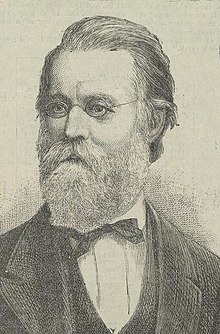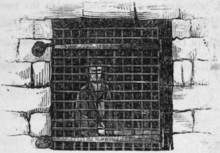T. L. Nichols
Thomas Low Nichols (1815 – 1901) was a physician, journalist, writer and advocate for a number of causes including free love, hydrotherapy, food and health reform, vegetarianism and spiritualism.
T. L. Nichols | |
|---|---|
 | |
| Born | Thomas Low Nichols 1815 Orford, New Hampshire, United States |
| Died | 1901 (aged 85–86) Chaumont-en-Vexin, France |
| Occupation | Physician, journalist, writer, activist |
| Spouse(s) | |
| Signature | |
Biography
Nichols was born in Orford, New Hampshire, in 1815. He studied medicine at Dartmouth College, until he dropped out and became a radical journalist.[1] Nichols apprenticed on newspapers in Lowell and New York, before becoming an editor and partial proprietor of the Buffalonian in 1837. An article he published while editor of the The New York Aurora, led to him serving four months in prison for libel;[2] Nichols later published Journal in Jail, an account of his experience, in 1840.[3]
In New York, Nichols completed his medical studies, later marrying Mary Gove in 1848.[3] Later, they founded a school for training water-cure therapists and published several books on health, food and other reforms.[3] Nichols was secretary of the American Hygienic and Hydropathic Association and the Society of Public Health and vice-president of the American Vegetarian Society.[1]

Between 1853 and 1857, Nichols published two journals, Nichols' Monthly and Nichols' Journal, to advocate for his beliefs.[3] In Nichols' Monthly, he partially published an epistolary utopian story, which he infused with his beliefs about free love, universal suffrage and libertarianism; it was later published in novel form in 1860.[4]
For some time, the couple lived in Josiah Warren's Modern Times free love anarchist community, based on Long Island.[5] In 1856, the couple left and founded a "school of life", called the Memnonia Institute, based in Yellow Springs, Ohio.[6] It collapsed in 1857 and the couple converted to Roman Catholicism.[1]
The couple relocated to London to escape the American Civil War.[1] Nichols published two further novels Uncle Angus (1864) and Jerry (1872), as well as a best-selling autobiography Forty Years of American Life in 1864.[1] Nichols started the Co-operative Sanitary Company in 1875 and the couple co-founded a health publication, the Herald of Health. The couple campaigned for temperance and dress reform and against military conscription, vivisection, vaccinations and capital punishment.[1] They also helped create several vegetarian restaurants in London.[1]
Mary died in 1884; after her death, Nichols moved to Sutton, Surrey, where he continued to publish his pamphlets.[1]
Nichols later moved to Chaumont-en-Vexin, France, where he died in 1901, at the age of 85.[7]
Legacy
Animal rights and vegetarianism activist Ernest Bell, credited Nichols' pamphlet How to Live on Sixpence A-day, as the initial inspiration for his vegetarianism.[8]
Selected publications
- Journal in Jail: Kept During a Four Months' Imprisonment for Libel, in the Jail of Erie County (1840)
- Esoteric Anthropology (The Mysteries of Man) (1853)
- Esperanza: My Journey Thither and What I Found There (1860)
- Forty Years of American Life (1864)
- Uncle Angus (1864)
- Jerry (1872)
- How to Live on Sixpence A-day (1873)
- The Herald of Health (1877)
- Dr. Nichols' Penny Vegetarian Cookery: The Science and the Art of Selecting and Preparing a Pure, Healthful, and Sufficient Diet Illustrated by Food Diagrams and Portraits of Distinguished Vegetarians (1888)
References
- Aspinwall, Bernard (2004-09-23). "Nichols, Mary Sergeant Gove (1810–1884), campaigner for medical reform and women's rights". Oxford Dictionary of National Biography. doi:10.1093/ref:odnb/9780198614128.001.0001/odnb-9780198614128-e-58353. Retrieved 2020-07-05.
- "Walking Tour: Walt Whitman's Printing House Square in New York City". Academy of American Poets. Retrieved 2020-07-07.
- Trahair, R. C. S. (1999). Utopias and Utopians: An Historical Dictionary. Westport, Connecticut: Greenwood Publishing Group. pp. 286–287. ISBN 978-0-313-29465-5.
- "Authors: Nichols, Thomas Low". Science Fiction Encyclopedia. Retrieved 2020-07-07.
- D'Emilio, John; Freedman, Estelle B. (2012). Intimate Matters: A History of Sexuality in America, Third Edition. Chicago: University of Chicago Press. p. 115. ISBN 978-0-226-92381-9.
- Stearns, Bertha-Monica (1942). "Memnonia: The Launching of a Utopia". The New England Quarterly. 15 (2): 280–295. doi:10.2307/360527. ISSN 0028-4866.
- Silver-Isenstadt, Jean L. (2002). Shameless: The Visionary Life of Mary Gove Nichols. Baltimore, Maryland: JHU Press. p. 248. ISBN 978-0-8018-6848-1.
- "Ernest Bell, President of the Vegetarian Society". The Vegetarian Messenger and Health Review. October 1933.
Further reading
- Braun, Adee (2014-07-02). "Passional Affinities: The free-love couple who pissed off nineteenth-century America". The Paris Review.
External links
| Wikimedia Commons has media related to Thomas Low Nichols. |